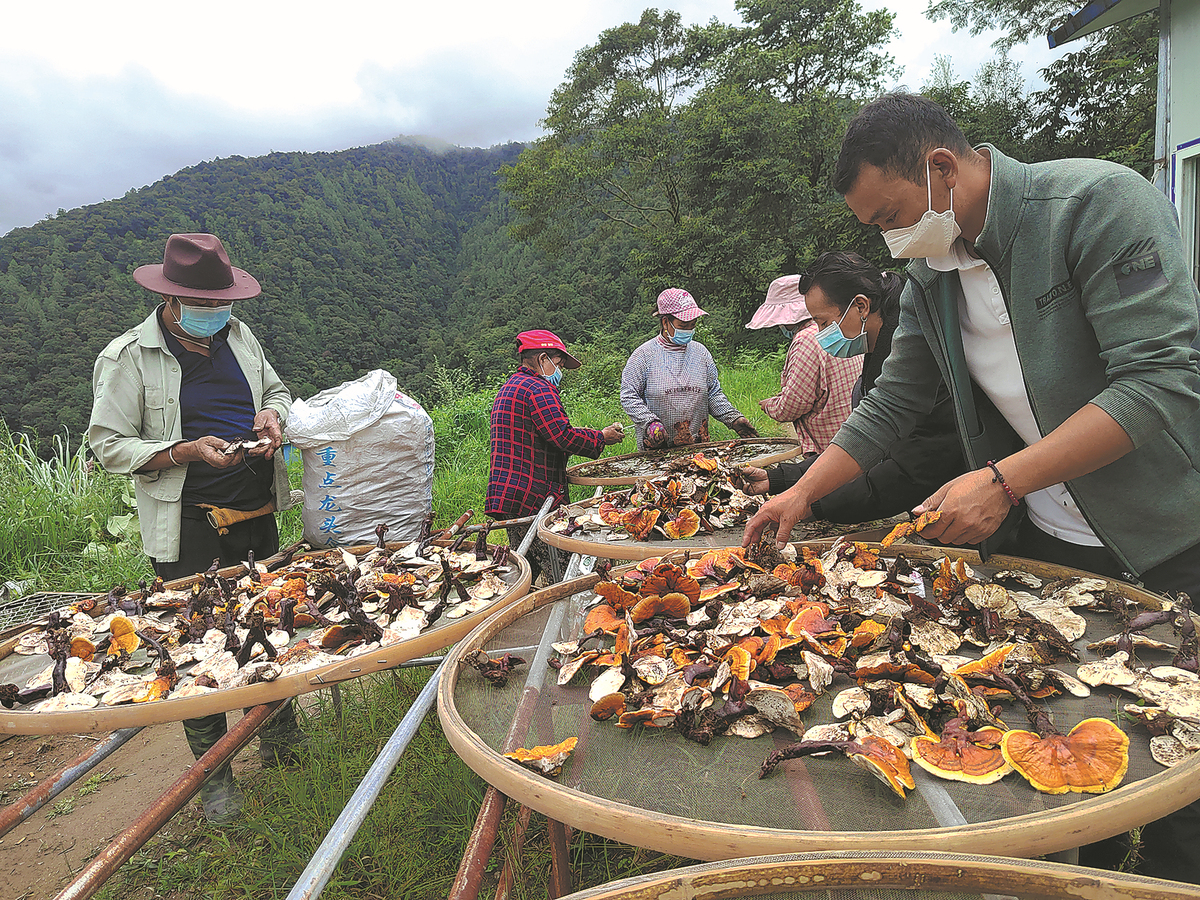Congress report inspires people in rural Tibet
Updated: 2022-10-20 By DAQIONG and PALDEN NYIMA in Lhasa (China Daily)  Print
Print 



Dorje Phuntsok (left) dries lingzhi fungus (Ganoderma) together with villagers in Jeling village in Metog, Tibet autonomous region, in July. [Photo/China Daily]
Teacher in highest town, village head in once-isolated county see brighter future
Nyima Tsamcho is a kindergarten teacher in Tsogo village of Puma Changthang, China's highest township, at an altitude of 5,373 meters — 200 meters higher than the base camp for Qomolangma, or Mount Everest.
After taking a hot butter tea on a Sunday morning, Nyima Tsamcho headed to the village activity center, wearing a thick down jacket, to join villagers to watch the live broadcast of the 20th National Congress of the Communist Party of China. On the plateau of the Tibet autonomous region, the weather had dropped to around 0 C and there was a chill in the air despite the dazzling sunshine.
"I felt excited and overwhelmed when watching the congress on TV," said Nyima Tsamcho.
Despite the harsh environment, Nyima Tsamcho volunteered to come and work in this kindergarten three years after graduating from Lhasa Normal College in 2017.
The kindergarten has nine kids and four teachers. As it is cold and windy there all year round, courses and activities are mostly carried out indoors. There is no running water from the end of October every year, as it easily gets frozen and teachers have to travel around one kilometer to fetch water.
"I am young, so I feel strong enough to work here, and I feel proud to work for the kids in a high-altitude environment," said the 25-year-old, adding she expects to continue to work for five to six years there if her body allows her to stay.
She said she is happy to learn that China has built the largest education system in the world and will continue to give high priority to the development of education and speed up the work to build a stronger education system.
"I am encouraged by these words, and I will work hard toward the goal of developing education that meets people's expectations," she said.
"Inspired by the report, I will read more books to renew myself with new knowledge and skills all the time, and I will be a more responsible teacher for my students," she added.
Meanwhile, the report to the congress also inspired the ethnic people in Monba, one of the smallest ethnic groups in China, in the region's Metog county.
Metog was only made accessible by highway in 2013, and was known as the last roadless county in the country before that.
Dorje Phuntsok, a leader of Jeling village of the county, said the part in the report about comprehensively promoting rural vitalization and developing agriculture and rural areas as a priority provided him with confidence and spirit.
Dorje Phuntsok never forgot the hardship he and his fellow villagers endured when his home county was isolated from the outside world because there were no proper roads.
Before 2013, his fellow villagers had to trek for three days to travel between his home county and Bomi, another county, to go shopping, but now the trip has been reduced to several hours by vehicle.
"Our country, especially my hometown, has seen tremendous changes over the past decade," said Dorje Phuntsok.
"Not only is our county accessible by highways, our village and homes were connected with proper roads between 2015 and 2017, and the local people now enjoy better livelihoods thanks to the upgraded traffic and transportation."
He said that in the past few years, his village has been developing a cooperative model as a key effort in rural vitalization and agricultural development, including the industries of animal husbandry, plantation and tourism.
"As a leader working in a rural village, I will work toward the goal of consolidating the achievements of poverty alleviation, and I will try to enrich our village by developing more rural industries," Dorje Phuntsok added.








